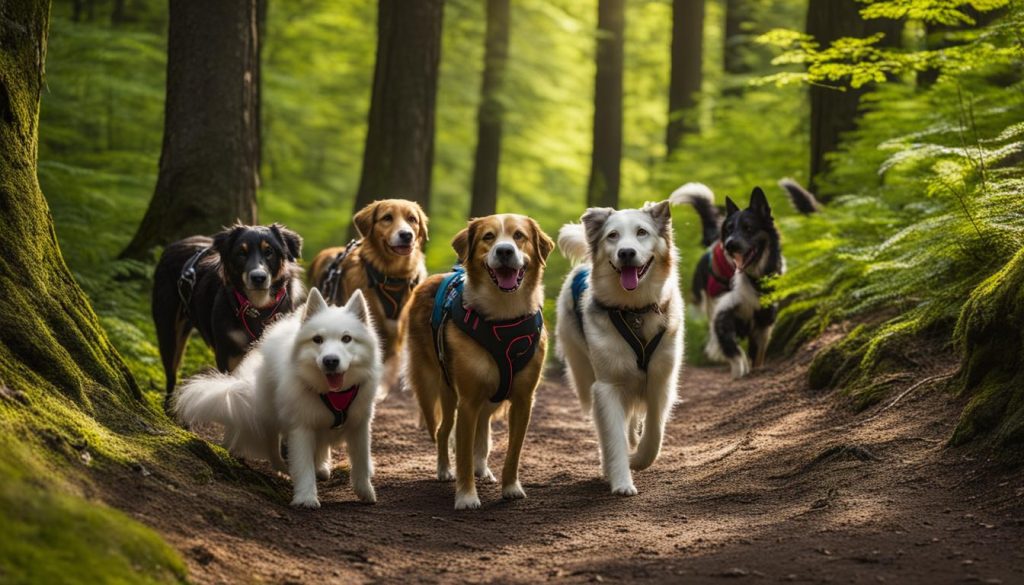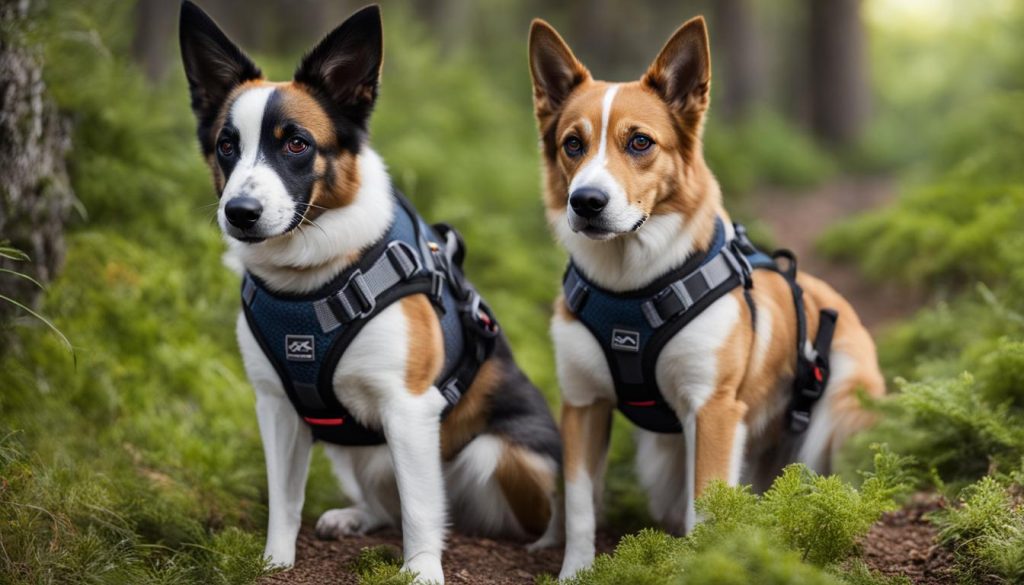Aging dogs can still enjoy the great outdoors through hiking. I recommend that you make accommodations and adjustments to ensure their comfort and enjoyment. Senior dogs can go hiking, but it depends on factors like their health, the weather, distance, terrain, and more. There are many benefits to hiking with senior dogs, including physical exercise, mental stimulation, reducing anxiety and depression, and bonding time. However, I would advise that you have a solid plan, assess your dog’s health, and modify the hike as needed to accommodate their specific needs.
Key Takeaways:
- Hiking is a great outdoor activity for senior dogs.
- Assess your dog’s health and fitness level before planning a hike.
- Choose hiking trails that are suitable for senior dogs.
- Make modifications to accommodate their specific needs.
- Provide proper recovery and care after the hike.
Why Hike With Senior Dogs?
There are numerous benefits to hiking with senior dogs. Not only does it provide them with physical exercise, which is necessary for maintaining strength and a healthy weight, but it also helps reduce boredom and provides mental stimulation through the sights, sounds, and smells of nature. Hiking can even help reduce anxiety and depression in senior dogs, promoting their overall well-being.
“Hiking with my senior dog has been a game-changer for both of us,” says Jane Smith, a seasoned hiker and dog owner. “Not only do we get to explore beautiful trails together, but it has also strengthened our bond and brought us closer than ever before.”
Spending time outdoors with your dog offers an opportunity for quality bonding time. It allows you to escape the hustle and bustle of daily life and enjoy the serenity of nature together. Whether it’s a leisurely stroll through a park or a more challenging hike up a mountain, the shared experience of navigating the trails creates lasting memories and strengthens the connection between you and your furry companion.
So, lace up your hiking boots, grab your senior dog’s leash, and get ready to embark on an adventure that will not only benefit their physical health but also bring joy and happiness to both of your lives.

Table: Benefits of Hiking with Senior Dogs
| Benefits | Description |
|---|---|
| Physical exercise | Helps maintain strength and a healthy weight |
| Mental stimulation | Engages their senses and provides mental enrichment |
| Reduced anxiety and depression | Outdoor exploration promotes emotional well-being |
| Bonding time | Strengthens the connection between you and your dog |
Assessing Your Dog’s Health
Before embarking on a hike with your senior dog, please assess their health. Consulting with your veterinarian will provide an objective opinion on your dog’s fitness level and help you determine if they are ready for the adventure. Consider their overall muscle tone, aerobic health, any disabilities, or health concerns that may impact the hike. Each senior dog has different challenges, such as vision or hearing loss, arthritis, or mobility issues. You should also plan hikes that accommodate their specific needs and limitations.
Assessing your dog’s health involves evaluating their ability to handle physical exertion, walk on various terrains, and tolerate changes in weather conditions. I recommend that you observe their endurance, breathing pattern, and recovery time during regular walks or shorter hikes. If your dog shows signs of fatigue, struggles to stand up or walk for long periods, or has difficulty breathing, it may indicate that they are not suitable for strenuous hikes.
Common Health Considerations for Senior Dogs
As senior dogs age, they may develop certain health issues that require special attention during hikes. Here are some common health considerations to keep in mind:
- Arthritis: Dogs with arthritis may experience joint pain and stiffness, making it essential to choose hikes with level terrain and shorter distances.
- Heart Conditions: Dogs with heart conditions may have limitations on their exercise levels. I recommend that you follow your veterinarian’s advice regarding the intensity and duration of the hike.
- Respiratory Problems: Some senior dogs may have respiratory issues that make it challenging for them to handle strenuous activities. Avoid hikes in extreme weather conditions, such as high heat or cold, as it can worsen their breathing difficulties.
- Vision or Hearing Loss: Senior dogs with vision or hearing loss may require additional support and guidance during hikes. Choose trails with fewer obstacles and potential hazards to ensure their safety.
By assessing your dog’s health and considering their specific needs, you can plan hikes that are enjoyable and safe for both of you. Try to consult with your veterinarian regularly to monitor any changes in your dog’s health and adjust their exercise routine accordingly.
| Senior Dog’s Health Considerations | Guidelines for Hiking |
|---|---|
| Arthritis | Choose hikes with level terrain and shorter distances to minimize joint stress. |
| Heart Conditions | Follow your veterinarian’s advice on the intensity and duration of the hike. |
| Respiratory Problems | Avoid hikes in extreme weather conditions that can worsen breathing difficulties. |
| Vision or Hearing Loss | Choose trails with fewer obstacles and potential hazards to ensure their safety. |
Planning the Hike
When planning a hike with a senior dog, please choose trails that are senior dog-friendly and suitable for their abilities. Here are some key considerations to keep in mind:
- Trail Difficulty: Look for trails with a lower difficulty level, preferably with flatter terrain and fewer steep inclines. This will ensure a more comfortable hiking experience for your senior dog.
- Distance: Opt for shorter hiking distances to prevent overexertion. You should also gauge your dog’s fitness level and choose a distance that matches their capabilities.
- Weather Conditions: Check the weather forecast before heading out on a hike. Extreme temperatures, both hot and cold, can be challenging for senior dogs. Choose days with milder weather to ensure their safety and well-being.
Researching the trail beforehand is crucial. Look for detailed information about the terrain, trail conditions, and any potential hazards. Reach out to park rangers or experienced hikers for recommendations on the best hiking trails for senior dogs in your area. Their insights can be invaluable in ensuring a safe and enjoyable hiking experience.
“Choosing a senior dog-friendly trail is vital to ensure your furry friend’s safety and comfort during the hike. Consider their abilities and limitations, and don’t hesitate to modify your plans if needed.”
Lastly, don’t forget to bring essential hiking gear for your senior dog, including a well-fitted harness with a handle for added support and control. This will make it easier to assist and guide them along the trail. Additionally, pack a first aid kit specifically designed for dogs and bring plenty of water and snacks to keep your senior dog hydrated and energized throughout the hike.

Tips for a Safe and Enjoyable Hike
Here are some additional tips to prioritize hiking safety for senior dogs:
- Start Slow: Gradually increase the difficulty and length of hikes as your senior dog builds stamina and strength.
- Monitor Signs of Fatigue: Keep a close eye on your dog during the hike. If they show signs of fatigue, such as heavy panting, lagging behind, or struggling to keep up, it’s time to rest and turn back if necessary.
- Paw Care: Check your dog’s paws regularly for any cuts, scrapes, or signs of discomfort. Protect their paws with dog booties or apply a paw protectant balm to prevent injuries.
- Stay Hydrated: Ensure your senior dog has access to fresh water throughout the hike. Hydration is crucial to prevent overheating and dehydration.
- Know Your Dog’s Limitations: Every senior dog is unique, so know their limitations and adjust the hike accordingly. Be mindful of any health conditions or disabilities that may require additional modifications.
By carefully planning your hikes and prioritizing your senior dog’s safety and comfort, you can create unforgettable outdoor adventures that both of you will cherish.
Modifications for Senior Dogs
When hiking with senior dogs, make modifications to ensure their safety, comfort, and enjoyment. By considering their specific needs and limitations, you can create a positive hiking experience for both you and your furry companion.
Choosing the Right Gear
Senior dogs may benefit from using specialized hiking gear that provides additional support and protection. Consider using a harness with a handle, which can help you assist your dog on more challenging terrain and provide stability. This type of harness also makes it easier to control and guide your dog during the hike.
Additionally, make sure your senior dog is wearing a comfortable and properly fitted collar or harness. This will ensure that they are secure and minimize the risk of any discomfort or strain while hiking.
Selecting Senior Dog-Friendly Hikes
Not all hiking trails are suitable for senior dogs. To ensure a safe and enjoyable experience, choose trails that are senior dog-friendly. Look for trails with flatter terrain, shorter distances, and fewer obstacles. These types of trails will be gentler on their joints and allow them to comfortably navigate the path.
Research local parks and hiking areas to find trails that are known to be senior dog-friendly. Take into account factors such as trail difficulty, accessibility, and any potential hazards that may pose a challenge for senior dogs.
| Trail Name | Terrain | Distance | Difficulty Level |
|---|---|---|---|
| Paw Prints Trail | Flat with slight inclines | 2 miles | Easy |
| Old Paws Trail | Gentle slopes | 3.5 miles | Moderate |
| Senior Tails Loop | Flat with some steps | 1.5 miles | Easy |
These senior dog-friendly hikes provide a balance of scenic beauty and manageable terrain, allowing your senior dog to enjoy the great outdoors while staying safe and comfortable.
Recovery and Care
After a fulfilling hike with your senior dog, please prioritize their recovery and care. Providing ample rest and allowing them time to recuperate is essential for their well-being. Keep a close eye on your dog’s recovery process, and if you notice any new limping, sore spots, or unusual symptoms, seek veterinary attention promptly. It’s better to address any potential issues early on to prevent further discomfort or complications.
One way to support your senior dog’s recovery is by using ice packs or heating pads to alleviate any inflammation or injuries they may have incurred during the hike. This can help soothe their muscles and joints and aid in the healing process. Additionally, monitoring their hydration levels and ensuring they are properly hydrated throughout the hike is crucial for their overall health and well-being.

To put it simply, recovery and care after a hike are just as important as the hike itself. By paying attention to their needs and providing the necessary support, you can ensure that your senior dog remains happy, healthy, and ready for their next adventure in the great outdoors.
Hiking Gear for Senior Dogs
When it comes to hiking with senior dogs, having the right gear is essential to ensure their safety, comfort, and well-being. Here are some must-have items to consider:
Harness with Handle
A harness with a handle is an excellent investment for hiking with senior dogs. It provides added support and makes it easier to lift or guide your dog over challenging terrain. Look for a harness that is adjustable, comfortable, and has reflective strips for increased visibility.
First Aid Kit for Dogs
Accidents can happen on the trail, so have a first aid kit specifically designed for dogs. Include items such as bandages, antiseptic wipes, tweezers for removing ticks, and any necessary medications that your dog may need in case of an emergency.
Heating Pad and Ice Pack
Senior dogs may experience muscle soreness or inflammation after a hike. A heating pad can help soothe their muscles, while an ice pack can reduce swelling and discomfort. Make sure to choose products that are safe for use on animals and always follow the manufacturer’s instructions.

| Item | Description |
|---|---|
| Harness with Handle | Provides added support and ease of handling |
| First Aid Kit for Dogs | Includes bandages, antiseptic wipes, tweezers, and medications |
| Heating Pad | Soothes muscles and provides comfort |
| Ice Pack | Reduces swelling and discomfort |
Having the right hiking gear for your senior dog can make a world of difference in their overall hiking experience. It ensures their safety, allows you to provide the necessary care and support, and gives you peace of mind as you explore the great outdoors together.
Adventures to Enjoy With Senior Dogs
While hiking is a popular activity for senior dogs, there are other outdoor adventures that they can also enjoy. These adventures allow you to bond with your furry companion while exploring new environments and providing mental and physical stimulation. Here are some of the best adventures for senior dogs:
Paddle Boarding
Take your senior dog paddle boarding for a low-impact and calming experience. Paddle boarding allows your dog to enjoy the water while providing a great full-body workout. Choose calm waters and start with short trips to ensure your dog feels comfortable and secure.
Camping
Camping can be modified to suit your senior dog’s needs. Choose a camping location near a trail or body of water that matches their fitness level. This allows them to explore the outdoors at their own pace while enjoying the sights, sounds, and smells of nature. Ensure that they have a comfortable place to rest and consider bringing a portable ramp to help them access higher areas.
Beach Trips
Beach trips are perfect for senior dogs as they can regulate their own activity levels while enjoying the freedom of running on the sand. The beach is a great place for them to exercise their muscles and joints, and the cool water can provide a refreshing break from the heat. Just be sure to provide plenty of shade and fresh water to keep them hydrated.
Bike Touring
If you have an active senior dog, bike touring can be a great adventure. You can cover more ground while your dog rests comfortably in a trailer or basket. This allows them to enjoy the sights and sounds of the outdoors without exerting themselves too much. Make sure to choose bike trails that are safe and suitable for your senior dog.
Road Trips
Road trips offer a wide range of activities that you can enjoy with your senior dog. Visit dog-friendly boutiques and breweries, explore state parks and national forests, or even go wine tasting at dog-friendly wineries. Road trips allow you to create new memories and experiences together while enjoying the open road.
Whether you choose to hike, paddle board, camp, visit the beach, go bike touring, or embark on a road trip, there are plenty of adventures for senior dogs to enjoy. Just remember to consider their individual needs and limitations, and always prioritize their safety and well-being. These experiences will not only provide physical exercise but also strengthen the bond between you and your senior dog.
Natural Ways to Support Senior Dogs
As our beloved dogs age, they may experience various health issues, including arthritis. Fortunately, there are natural ways to support their well-being and improve their comfort. One option is using CBD oil, which has been shown to have anti-inflammatory properties and can help manage pain in senior dogs.

Another natural remedy is incorporating supplements like turmeric and bone broth into their diet. Turmeric contains curcumin, a compound with anti-inflammatory properties, while bone broth provides essential nutrients like collagen and glucosamine, which support joint health. Additionally, omega-3 fatty acids derived from wild salmon oil can help reduce inflammation and improve mobility in senior dogs.
Other natural therapies that can benefit senior dogs include acupuncture and massage. Acupuncture involves the insertion of thin needles into specific points on the body to stimulate healing and reduce pain. Massage, on the other hand, helps relax muscles, improve circulation, and alleviate tension. Both of these therapies can provide physical and emotional benefits for aging dogs.
Quotes:
“By utilizing natural remedies, we can effectively manage arthritis pain in senior dogs, allowing them to live a more comfortable and active life,” says Dr. Jane Mitchell, a veterinarian specializing in senior dog care.
“Incorporating natural supplements and therapies can complement traditional veterinary care, providing holistic support for our senior dogs,” says Dr. Jennifer Anderson, a holistic veterinarian.
Table: Natural Remedies for Senior Dogs
| Remedy | Benefits |
|---|---|
| CBD oil | – Anti-inflammatory properties – Pain management |
| Turmeric | – Anti-inflammatory effects – Joint health support |
| Bone broth | – Provides essential nutrients – Supports joint health |
| Wild salmon oil | – Reduces inflammation – Improves mobility |
| Acupuncture | – Stimulates healing – Reduces pain |
| Massage | – Relaxes muscles – Improves circulation |
These natural remedies can help alleviate arthritis pain, improve mobility, and enhance the overall quality of life for our senior dogs. However, I would advise that you consult with a veterinarian before starting any new supplements or treatments to ensure they are appropriate for your dog’s specific needs.
Final Thoughts
Hiking with senior dogs is a wonderful way to enjoy the great outdoors and create lasting memories with your furry companion. It provides an opportunity for physical exercise, mental stimulation, and bonding time. By assessing your dog’s health and making necessary adjustments, you can ensure their comfort and safety on the trails.
When planning a hike, choose trails that are suitable for your senior dog’s fitness level and take into account factors such as distance, terrain, and weather conditions. Modify the hike as needed, opting for flatter terrain and shorter distances. Prioritize their well-being by monitoring their condition, taking breaks for rest and hydration, and using appropriate hiking gear.
After the hike, provide your senior dog with ample time to rest and recover. Keep an eye out for any signs of discomfort or injury, and consult with your vet if needed. By taking these steps and prioritizing your senior dog’s needs, you can ensure a safe and enjoyable hiking experience for both of you.
FAQ
Can senior dogs go hiking?
Yes, senior dogs can go hiking, but it depends on factors like their health, the weather, distance, terrain, and more.
What are the benefits of hiking with senior dogs?
Hiking with senior dogs provides physical exercise, mental stimulation, reduces anxiety and depression, and strengthens the bond between you and your dog.
How do I assess my senior dog’s health before hiking?
Consult with your vet and consider factors like muscle tone, aerobic health, disabilities, and any health concerns that may impact the hike.
What should I consider when planning a hike with a senior dog?
Choose trails that meet your dog’s fitness and comfort level, look for flatter terrain, shorter distances, and calmer weather conditions.
How can I modify a hike for my senior dog?
Modifications may include choosing shorter distances, flatter terrain, and calmer weather conditions. Use a harness with a handle for added support and be flexible with hiking dates.
How should I care for my senior dog after a hike?
Provide plenty of rest and recovery time, monitor their recovery, use ice packs or heating pads for inflammation or injuries, and ensure they are properly hydrated.
What gear do I need for hiking with a senior dog?
Consider a harness with a handle, a first aid kit specifically designed for dogs, a heating pad, an ice pack, and an orthopedic blanket or pillow for comfortable rest.
What other outdoor adventures can senior dogs enjoy?
Senior dogs can enjoy activities like paddle boarding, camping, beach trips, bike touring, and road trips, with accommodations to their fitness level.
Are there natural ways to support the health of senior dogs?
Yes, options include giving them CBD oil, natural joint supplements, omega-3 fatty acids, acupuncture, and massage. Always consult with your vet before starting new treatments.






